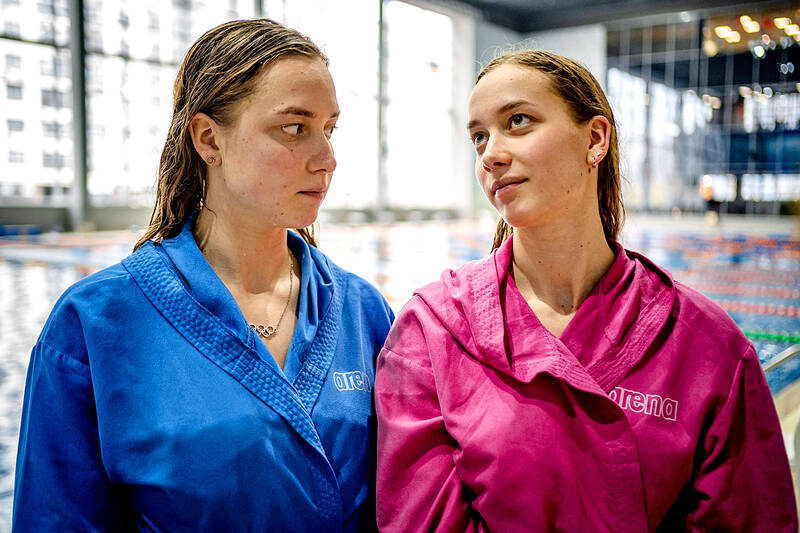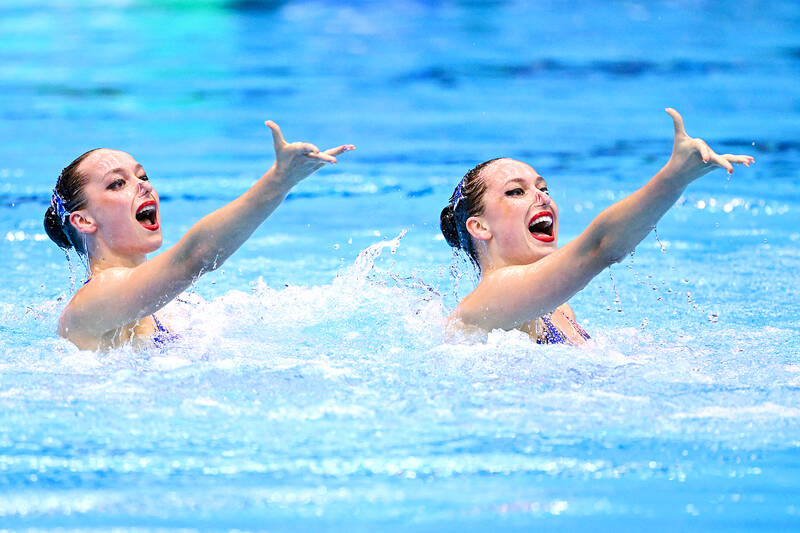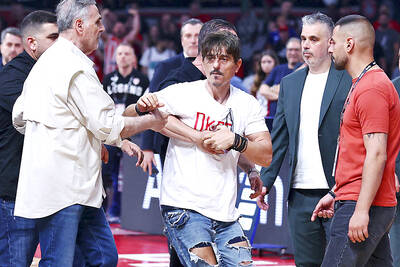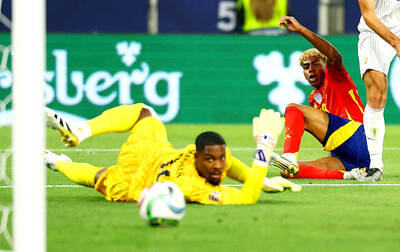As synchronized swimmers, Maryna and Vladyslava Aleksiiva are used to having to smile no matter what.
The sunny sisters are one of Ukraine’s best hopes of a gold medal at the Paris Olympics after winning a bronze in artistic swimming at the Tokyo Games three years ago.
However, the trials the 22-year-old twins have been put through — forced to flee their homes, surviving shelling and sleeping in bomb shelters — have tested even their stoicism.

Photo: AFP
They have even had to jump out of the pool and “run to the basement in wet swimsuits” when the explosions got too close, Maryna Aleksiiva said.
Russian tanks were stopped in the suburbs of their hometown Kharkiv during the invasion almost two years ago, with the sisters having to leave their sparkly costumes behind when they fled. Regular bombardments have not stopped them from returning to Kharkiv to prepare for the Games, even if the windows of their training pool are still broken from the missile attacks the border city is often subjected to.
“Everything has been bombed: our pool, where we started training, our school, our city center,” Maryna Aleksiiva said.

Photo: AFP
While the Ukrainian army eventually pushed the Russian troops back, Kharkiv is still vulnerable, only 30km from the border. Last week, 11 people were killed in the latest wave of Russian missile attacks on the city.
It is not exactly the ideal environment for elite swimmers to go for gold, especially when there is no generator to warm the water when the power fails, as it often did last year after the country’s electricity grid took a pounding from the Russians.
“When the war started, we did not know what to do,” said Vladyslava Aleksiiva, the shyer of the two, who often lets her twin finish her sentences. “But then we understood our main goal could be to show courage all over the world in competitions.”
“To show Ukraine is still alive,” Maryna Aleksiiva added. “We must show strength.”
With the Russians threatening to take the city in the early days of the war, the sisters fled Kharkiv with the rest of Ukraine’s artistic swimming team and trained in Italy for six months.
However, they were determined to go back to Ukraine to be closer to their parents, training in Kyiv and “sleeping at night in the corridor of a bomb shelter” before returning to Kharkiv.
They have not left their home city — the heart of Ukraine’s artistic swimming scene — since then, except for short trips abroad to compete.
Even if it is more dangerous, “it’s much better to be together, [even] without electricity and music to train,” Vladyslava Aleksiiva said during a break in the World Aquatics Artistic Swimming World Cup in France in May last year, when they won the duet gold.
“I called mum yesterday, but it was an air raid alert and I was a little bit nervous,” Maryna Aleksiiva said at the time. “Mum and dad said: ‘Don’t worry, we’re fine.’ So we tried to keep calm and concentrate on our competition.”
In July at the World Aquatics Championships in Fukuoka, Japan, they struck an even more somber note.
“It is hard to focus when your country is at war and you are away from family,” Vladyslava Aleksiiva said. “We have friends who are sportsmen who died on the battlefield defending our country ... it is an awful time for us.”
Yet back on their sofa in Kharkiv on a rare day off in November, they did not turn a hair when the air raid siren sounded, even though Maryna Aleksiiva’s apartment is on the top floor and more exposed to shelling.
The sirens go off “five or six times every day” she said. “At night also. It’s normal.”
Every morning they read the news to see if it’s safe to train, only going to the bomb shelter when it is really dangerous.
Vladyslava Aleksiiva lives next door with her husband, which is handy because “we always swap clothes, handbags, jackets, shoes,” Maryna Aleksiiva said.
On their lazy Sunday morning off — the one day they do not have to train at 6:30am — the sisters wore jeans and jumpers and light makeup in contrast to the heavy warpaint they put on for performances.
Lying on a table nearby was Maryna Aleksiiva’s bronze Olympic medal from Tokyo. Her sister took hers with her when they fled to Italy because it was “the most dear to me.”
“I was sure that they would be stars,” said their childhood trainer, Maryna Krykunova, who first came across them when they were eight years old.
Even then they were tall and supple and naturally in sync for duets, she said.
With girls who are not siblings, “we have to spend a lot of time making them similar,” she said. “With Maryna and Vlada, they are already twins so it’s much better.”
The last qualifying rounds are at the world championships in Qatar next month, with the team building up for the European Aquatics Championships in Belgrade in June, a dress rehearsal for the Games the following month.
“This is the most important time in our lives,” Vladyslava Aleksiiva said, adding that they have to prepare in “unequal conditions” compared with their rivals.
“We’ve been training every day for seven hours and we have a goal ... to show the courage of our country to the whole world,” Vladyslava Aleksiiva said.
A medal in Paris would be the ultimate riposte to their Russian competitors who messaged them in the first days of the invasion telling them: “Don’t worry, we will save you ... it’s a safety operation.”
“You’re crazy,” Maryna Aleksiiva said she replied. “I invite you to Kharkiv and you will see how my home town is now ... everything has been bombed.”

The Greek basketball league finals between Panathinaikos and Olympiakos were suspended by the government on Monday following on-court scuffles involving rival security teams. The best-of-five series is at 1-1. The third game, scheduled for today, has been postponed. The owners of both clubs were summoned to meet with the country’s sports minister. They “will be asked to provide explicit guarantees that this situation will be brought to an end. If not, this year’s championship will be definitively canceled,” government spokesman Pavlos Marinakis said. “There can be no tolerance for such pathological phenomena of violence and delinquency.” In online posts, the owners of Panathinaikos and

The Crusaders yesterday produced a clinical performance in difficult conditions to beat the Queensland Reds 32-12 and claim home advantage in next week’s Super Rugby semi-finals. Lock Scott Barrett and prop Tamaiti Williams scored first-half tries to reward an outstanding performance from the Crusaders’ forwards in wet, slippery conditions and bitterly cold temperatures. Scrumhalf Noah Hotham defied the conditions in the second half to score a superb solo try and, after kicking a conversion and penalty to make the score 22-0 at the hour mark, flyhalf Rivez Reihana scored a try which took the game beyond the Reds. “Typical Christchurch weather, cold, wet

Ryan Yarbrough picked up a dazzling World Series ring from his time with the Los Angeles Dodgers last season. Then he went out and beat them. The New York Yankees starter on Sunday pitched one-run ball over six innings, struck out a season-high five and blanked the Dodgers’ top four hitters in a 7-3 win. “I feel like I’m in a really good place right now and really trying to continue that,” Yarbrough said. “I’m having a lot of fun.” The 33-year-old left-hander made 44 relief appearances between the Dodgers and Blue Jays last season. The Dodgers designated him for assignment on July

Spain starlets Lamine Yamal and Nico Williams dazzled on Thursday as La Roja beat France 5-4 in a thriller in Stuttgart, Germany, to set up a UEFA Nations League final with Portugal. Yamal bagged a brace, while Williams scored and provided an assist as the two wingers cut France’s makeshift defense to ribbons. Mikel Merino and Pedri were also on the score sheet for the UEFA Euro 2024 champions. Kylian Mbappe netted a second-half penalty, but Spain were 5-1 up and cruising, before Les Bleus suddenly woke up as their opponents took their foot off the pedal. France’s three late goals — a